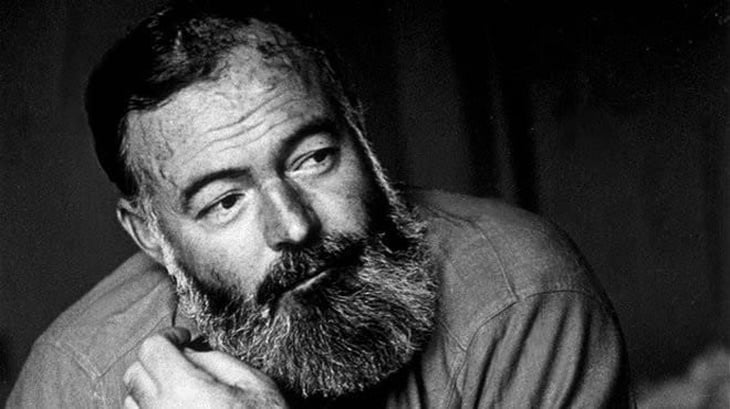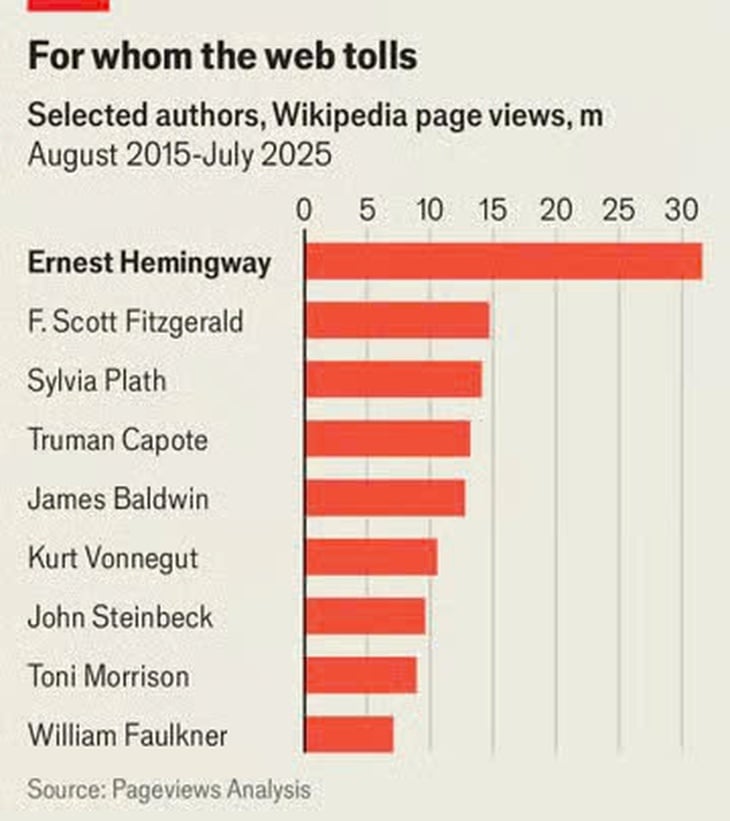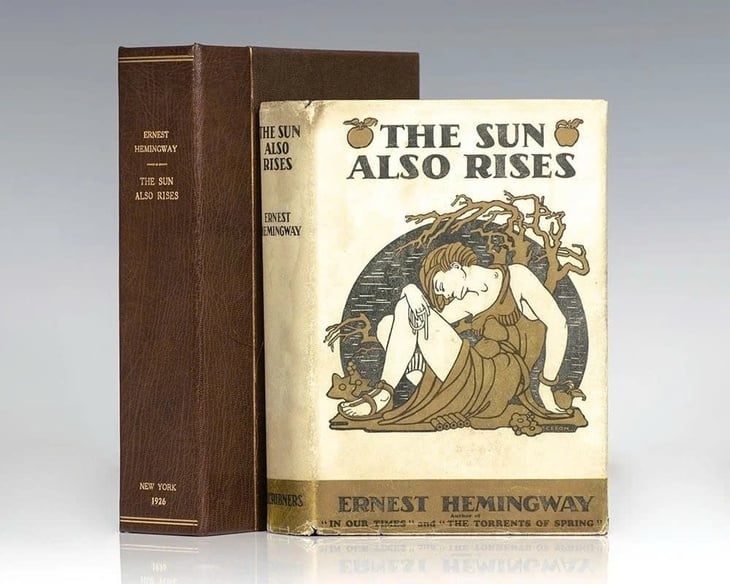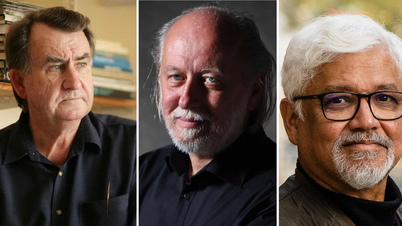Writer Ernest Hemingway
According to The Economist , Ernest Hemingway is the most mentioned American novelist in the Google Books database, and has more Wikipedia traffic than contemporaries such as F. Scott Fitzgerald or John Steinbeck.
The Economist recently published an article explaining in detail why Ernest Hemingway is still the most famous American writer of the 20th century?
Distinctive writing style, 'timeless' influence
In the early 1920s, Ernest Hemingway was an unknown journalist in Europe, living a wandering life and having many "adventures" with alcohol.
Wikipedia traffic statistics chart of Ernest Hemingway and some contemporary writers - Photo: The Economist
Everything changed in 1925 when he published his first collection of short stories , In Our Time, and began writing the novel The Sun Also Rises.
Published in October 1926, The Sun Also Rises realistically depicts the pain and horrific loss of war.
The book successfully portrays the portrait of the people Ernest calls "the lost generation".
They were the survivors of the war, alone, lost, living aimlessly and at the mercy of fate.
This work quickly became an icon of post-World War I European literature, transforming Ernest from obscurity into a phenomenon.
According to The Economist , the first reason why Ernest's writing became famous and immortal was because he shaped a completely different style of writing. Short, unadorned sentences, but with emotional weight, made his writing as sharp as a razor.
As Ernest Hemingway once said: "If a writer knows enough about what he is writing, he can leave out unnecessary details. If the writing is honest enough, the reader will feel the unsaid things as strongly as if the author had said them himself."
This style of writing was later called the "iceberg principle" by Ernest, showing minimalism so that the hidden content is what haunts. His concise style has had a profound influence on many famous writers such as: Norman Mailer, Cormac McCarthy, Raymond Carver and modern journalism. Writer Joan Didion, with her restrained style, was once likened to "Hemingway on the sober side".
Floridita Cafe, where writer Ernest Hemingway often visited during his lifetime - Photo: picstopin
A life like a novel
Ernest's characters also leave a lasting impression. They are the embodiment of courage, which he calls "grace under pressure," composure in adversity.
From Lieutenant Frederic Henry in A Farewell to Arms , the old fisherman Santiago in The Old Man and the Sea or Francis Macomber in The Short Happy Life of Francis Macomber, all overcame fear with a tragic beauty.
US President John F. Kennedy asked Ernest for permission to use the definition of "grace under pressure" in his book Profiles in Courage, which won the Pulitzer Prize in 1957.
Former Senator John McCain loved For Whom the Bell Tolls (For Whom the Bell Tolls) to the point of quoting it in his last book: "This world is a good place and worth fighting for and I am sorry to leave it."
The Sun Also Rises
And the final, perhaps most important reason for shaping Ernest Hemingway into a famous 20th-century writer is that his life became legendary, according to The Economist.
He was married four times, drank like water, braved death in both world wars, ran with the bulls in Spain and survived a plane crash in Africa. But behind that arrogant exterior was a vulnerable, fragile soul, even suffering from depression.
Ernest was one of seven members of his family who committed suicide, making his life the subject of endless biographies and documentaries, such as Ken Burns' six-hour series airing in 2021.
Forever or will it fade away?
Despite his great influence, many people think that Ernest's writing is becoming outdated. Compared to his contemporaries F. Scott Fitzgerald or John Steinbeck, his books have been adapted into films less often and do not receive many high reviews on Goodreads.
According to The Economist , some of the characters in his works have a sexist or racist tone that is becoming increasingly inappropriate for modern society.
If so, he might become like Lord Byron and Oscar Wilde, no longer widely read but still remembered as an icon.
And as he wrote in For Whom the Bell Tolls : "No man is an island; each man is part of a continent, an ocean." Despite his seeming isolation, Ernest always connected with the times with short but resonant sentences.
Back to topic
Lam Lake
Source: https://tuoitre.vn/ernest-hemingway-van-la-nha-van-my-noi-tieng-nhat-the-ky-20-20250805165143924.htm









































![[Photo] General Secretary To Lam and National Assembly Chairman Tran Thanh Man attend the 80th Anniversary of the Traditional Day of the Vietnamese Inspection Sector](https://vphoto.vietnam.vn/thumb/1200x675/vietnam/resource/IMAGE/2025/11/17/1763356362984_a2-bnd-7940-3561-jpg.webp)









































































Comment (0)